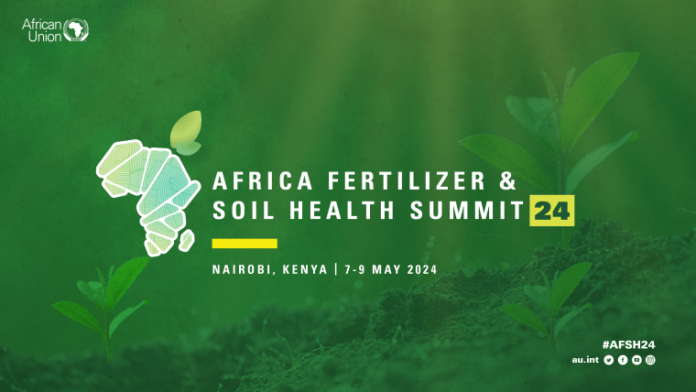Nairoby City will on 7-9 May 2024 host Africa Fertilizer and Soil Health (AFSH) Summit at the Kenyatta International Conference Centre (KICC).
Organized by the Department of Agriculture, Rural Development, Blue Economy and Environment (DARBE) of the African Union in collaboration with AUDA-NEPAD, RECs and Partners, the summit is in response to the recommendation of AU policy organs.
It will be held to deliberate on Africa’s recent widespread decades-long decline in soil quality of farmland – a phenomenon that continues today and negatively impacts the agricultural production capacity and food security in the continent.
Fertilizer and Soil Health Hub for West Africa and the Sahel launch
During the event, the Economic Community of West African States (ECOWAS) will officially launch the Fertilizer and Soil Health Hub for West Africa and the Sahel.
This is part of the organization’s roadmap to improve soil health, agricultural productivity, and sustainability in the region.
This side event, titled “A Sustainable Food Secure Future for West Africa and the Sahel: Launching a New Regional Hub for Strengthening the Fertilizer Sector and Improving Soil Health,” will take place at Tent 4 (Lawns) at the Kenyatta International Conference Centre (KICC).
It will be an opportunity to learn about the Hub’s goals and plans.
The Hub’s headquarters is located at the International Institute of Tropical Agriculture (IITA) campus in Ibadan, Nigeria, with a subsidiary hub at the University Mohammed VI Polytechnic (UM6P) in Ben Guerir, Morocco. The Ibadan headquarters is set to be inaugurated at the end of May 2024.
The Hub’s vision is to improve long-term soil health and fertility for enhanced yield, efficient resource use, and climate resilience. This mission will be achieved through various activities, including soil information dissemination, agronomic recommendations, and capacity development.
The initiative is governed by a Consortium Steering Committee with representatives from key partners, including ECOWAS (Economic Community of West African States), the International Fertilizer Development Center (IFDC), OCP Africa, the African Plant Nutrition Institute (APNI), University Mohammed VI Polytechnic (UM6P), the International Institute of Tropical Agriculture (IITA) and the World Bank through the Accelerating Impacts of CGIAR Climate Research for Africa (AICCRA) project.
Background of AFSH
In June 2006, the Heads of State and Governments of the African Union endorsed the Abuja Declaration on Fertilizer for the Africa Green Revolution, a continental strategy to reverse the worrying trend of poor productivity of the African soils.
The Declaration focused on key targets required for agricultural growth, food security, and rural development in Africa, with a focus on the role of fertilizers.
It recommended raising the use of fertilizers from 8 kg/(nutrients)/ha to 50 kg (nutrients) /ha in 10 years and the establishment of an African Fertilizer Financing Mechanism (AFFM) with the objective of improving agricultural productivity by providing financing required to boost fertilizer use in Africa to achieve the target of 50 kg of nutrients per hectare, as mandated by the Abuja Declaration.
Fifteen years after the Abuja Declaration, Africa’s agriculture and food security narrative has evolved significantly. The fertilizer market itself has changed, including the roles that private and public sector actors are playing.
Another major change since Abuja, is the increased recognition of the critical role of sustainable soil management. The decline in soil health has hindered the efficiency of fertilizer use and hampered agricultural productivity growth, food security, and environmental sustainability across the continent.
As a result, economic growth and well-being—particularly for the rural population, who derive their livelihoods directly from agriculture – in the continent have been hampered.
It is therefore, timely to review the state of Africa’s soil health to recalibrate the strategies being deployed for boosting the productivity of soils towards higher and sustainable gains in crop yields as well as economic growth and transformation, and overall well-being.









